|
|

This chapter describes how to install the Maintenance Manager software and connect the ONS 15252 Multichannel Unit (MCU) or ONS 15201 Single-Channel Unit (SCU) to a laptop computer. To connect to a desktop computer, contact the Cisco Technical Assistance Center (TAC) at 1-877-323-7368 for instructions.
Before installing Maintenance Manager software, thoroughly review the prerequisites. This section explains the hardware and software requirements for successful installation.
 |
Note If the Control Area Network (CAN) board has not been installed in the PC that will run the Maintenance Manager software, you must install the hardware driver. Read the installation instructions included on the Maintenance Manager CD-ROM. |
Complete work in the following order:
Step 2 Shut down all applications.
Step 3 Install the Maintenance Manager.
The following minimum system requirements must be met before you can install Maintenance Manager software.
The following procedure describes how to install the Maintenance Manager software using a CD-ROM.
Step 2 After a few seconds, the ONS 15200 Maintenance Manager Operator - InstallShield Wizard window opens (Figure 1-1).
 |
Note If the InstallShield Wizard does not open, use Windows Explorer to navigate to the CD-ROM drive and double-click the setup.exe file. |
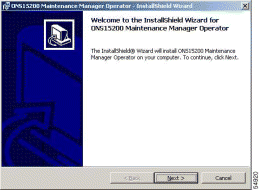
Step 3 Click Next. The License Agreement screen appears (Figure 1-2).
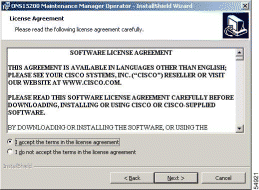
Step 4 Read the terms, and click I accept the terms in the license agreement.
Step 5 Click Next. The Customer Information screen appears (Figure 1-3).
Step 6 Type the user name and organization in the appropriate boxes.
Step 7 Select Anyone who uses this computer (all users) or Only for me (Cisco user).
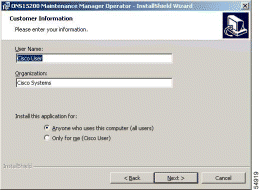
Step 8 Click Next. The Destination Folder Window appears (Figure 1-4).
Step 9 Select the folder where you want the Maintenance Manager software to reside. The default location is C:\Program Files\Cisco\ONS15200\MM Operator\. To choose a different location, click Change. After selecting the location, click Next.
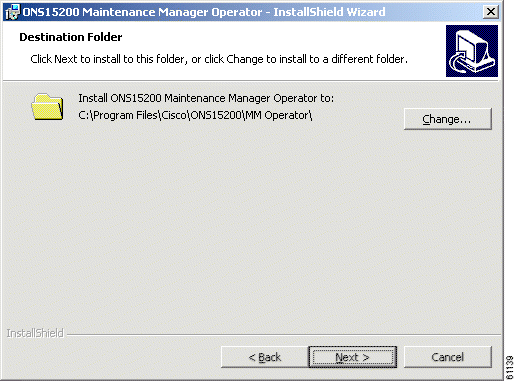
Step 10 Click Next. The Ready to Install Window appears (Figure 1-5).
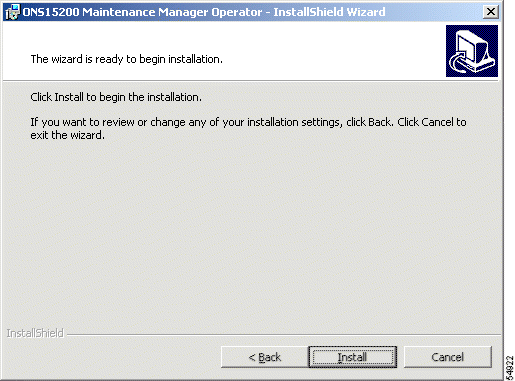
Step 11 Click Install. The Maintenance Manager begins installing. When installation is complete, a message will appear that says, "InstallShield Wizard Completed." Click Finish.
The following sections describe how to connect a laptop computer running Maintenance Manager to an ONS 15200. Connection to the ONS 15200 must be made directly to either an MCU or an SCU. You cannot connect Maintenance Manager to the ONS 15200 indirectly using a local area network (LAN).
Restrictions determine which network elements (NEs) can be accessed based on the unit where the Maintenance Manager is physically connected. If the Maintenance Manager is connected to an SCU, you can only view information for the CLIP module installed in that SCU and its mate, which is assigned the same ITU channel, in another SCU or MCU. All other channels in the network are invisible. If the Maintenance Manager is connected to an MCU, you can see all the CLIP modules installed in that MCU as well as the mates of that MCU's CLIP modules.
 |
Note If you connect the Maintenance Manager directly to an MCU, only that Maintenance Manager will receive alarm notifications from the CLIP modules in view, even if other MCUs or SCUs were connected prior to the latest MCU's connection. Before connecting the Maintenance Manager to an MCU, you should make sure no one is already accessing Maintenance Manager through another MCU or SCU in the network. |
The following procedure describes how to connect a laptop with Maintenance Manager to the ONS 15252 MCU. To connect to a desktop computer, contact the Cisco Technical Assistance Center (TAC) at 1-877-323-7368.
If this is the first time the CAN board is being installed in the computer, the hardware driver must be installed. To install the hardware driver, read the installation instructions included on the Maintenance Manager CD-ROM.
Step 2 Attach the RJ-45 connector at the end of the CCAN LINE connector cable to the Maintenance Access (MA) port on the Communications Interface module (CIM) (Figure 1-6). The CIM is located below the Network Control Board (NCB) module in Slot 17 on the right side of the MCU. The MA connection on the CIM module is a standard RJ-45 connector.
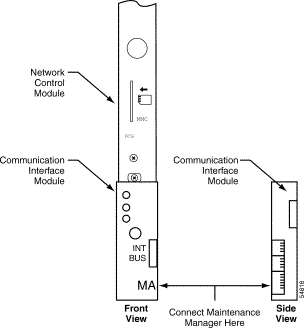
Step 3 Connect the DB-9 connector at the end of the MA CAN cable to the DB-9 connector at the end of the DRV CAN cable. The DRV CAN cable is the black cable with the large cylindrical component in the middle.
Step 4 On the laptop, connect the DRV CAN cable to the port labelled "1" located on the left side of the CAN board. Figure 1-7 illustrates the completed connection.
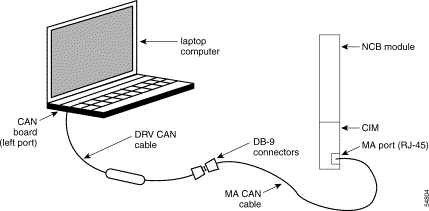
Step 5 When the two cables are connected from the laptop to the MA port, open Maintenance Manager.
The following procedure describes how to connect a laptop with Maintenance Manager to the ONS 15201 SCU. To connect to a desktop computer, contact the Cisco Technical Assistance Center (TAC) at 1-877-323-7368.
 |
Note If this is the first time the CAN board is being installed in the computer, the hardware driver must be installed. To install the hardware driver, read the installation instructions included on the Maintenance Manager CD-ROM. |
Step 2 Attach the RJ-45 connector at the end of the MA CAN connector cable to the Maintenance Manager connector on the SCU (Figure 1-8). The MA connection on the module is a standard RJ-45 connector.
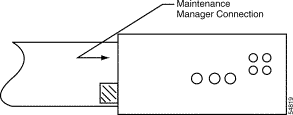
Step 3 Using the DB-9 connector, connect the end of the DRV CAN cable to the DB-9 connector at the end of the CAN cable. The CAN cable is the black cable with the large cylindrical component in the middle.
Step 4 Connect the DRV CAN cable to the computer. The CAN cable connects to the PCMCIA connector on the CAN board. Figure 1-7 illustrates the completed connection.
Step 5 When the two cables are connected from the laptop to the MA port, open the Maintenance Manager. The Maintenance Manager main window opens.
The following procedure describes how to uninstall the Maintenance Manager application.
Step 2 Choose ONS 15200 Maintenance Manager Operator from the list.
Step 3 Click OK.
To upgrade Maintenance Manager to a more recent version, you must first uninstall the older version and then install the newer version. Follow the procedure in the "Uninstalling Maintenance Manager" section and then follow the procedure in the "Installing the Maintenance Manager Software" section.
The following procedure describes how to open the Maintenance Manager application.
Step 2 Choose Programs > ONS 15200 > MM Operator.
Step 3 The Maintenance Manager main window opens.
To exit the Maintenance Manager program, choose Exit from the File menu.
![]()
![]()
![]()
![]()
![]()
![]()
![]()
![]()
Posted: Mon Jan 7 02:13:49 PST 2002
All contents are Copyright © 1992--2002 Cisco Systems, Inc. All rights reserved.
Important Notices and Privacy Statement.